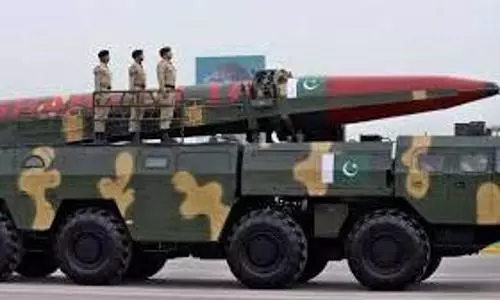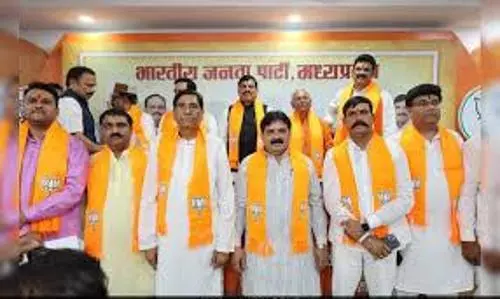
Mahathir or Malaysia?
text_fieldsMalaysia has pulled another surprise in world politics. In a game using democracy, Mahathir Mohamed, seen as the architect of modern Malaysia, has proved invincible.
At the age of 92, the former long term prime minister, has staged a comeback to politics belying the hopes and fears engendered by the 9 May elections that lasted until the counting of votes, and has become the prime minister. Malaysia is witnessing a political turning point unparalleled in contemporary world politics. With a legacy of transforming democracy to autocracy and then again to democracy, Mahathir in a way stunned the world by forming a political alternative to his own party with a history of six decades. Then came the picture of swapping enemies and friends and competing to capture power. But even then, many had wondered if at his advanced age Mahathir could hold on against his successor Najib Abdul Razak, enthroned by himself on his own merit after easily removing his immediate successor Abdulla Badawi. But Mahathir emerged the eventual winner. And the world is perhaps eagerly awaiting the moment when Mahathir himself will bring out of jail, and elevate to power that one-time adversary whom one fine morning he had put in prison – Anwar Ibrahim.
Ever since 1957 Malaysia has been ruled by Barisan Nasional front led by the largest political party of the country, United Malays National Organization (UMNO). The history of the new prime minister, ever since he joined it seven decades ago, is one of being the party's friend and foe. A man who raised in revolt against the then prime minister Tunku Abrul Rahman and quit the party, staged yet another resignation drama even after he became the party's prime minister. He was never shy of courting friends in turns, with steady focus was on holding power safely. What made him stand out is that on the strength of such an iron hand, he took Malaysia on a path of rapid progress. He was able to be one of the rare vibrant leaders of the world by being in the forefront to modernize Malaysia. When its fruits became visible, and Malaysia became the hope of the East, Mahathir's popularity also shot up.
Together with his standing over the urban middle class, he succeeded in taking along with him some among the Islamic parties with regional influence, and some of the Chinese and racial Indian parties by which he could create an impression that Malaysia meant Mahathir. Whenever that position was under any threat, he was vigilant to suppress all counter voices. The first casualty was his close ally and deputy prime minister, Anwar Ibrahim whose wings were clipped in 1998. When the West lauded Malaysia's economic reform measures calling it 'Anwaronomics', he smelt danger, then trapped him in cases and put him in jail. Twenty-two years later, he found an alternative in Abdulla Badawi and stepped down by handing over power to him.
But when in the elections of 2009 Anwar Ibrahim made a landslide victory, that was doom time for Badawi. Raising the threat against Badawi that if the 'incompetent' does not step down, he would quit the party, Mahathir won his case and gave the next turn to Najib Abdul Razak. Having mastered the art well under his mentor, Najib not only played the same strategy, but even went a step ahead of Mahathir. But Najib could not do well in governance. Cost of living rose, and racial intolerance and resultant confrontations increased. Crisis developed in education and freedom of expression. When despite all this Najib refused to step down, Mahathir resigned from the party and formed a new one. When it came to a situation that Najib had to be brought down at any cost, he formed an alliance with the support of Anwar Ibrahim – who was jailed on charges of corruption and immoral acts -, Islamic party 'Amana' and Democratic Action Party of the liberal Lef, and stood in the forefront as prime ministerial candidate. Thus, winning 112 of the 222 parliamentary seats, Pakatan Harapan coalition rose to power.
With the scenario of the reincarnation of Mahathir and Anwar Ibrahim, who had once parted ways during times when Malaysia was hailed as Asian tiger, it is bound to have no small impact on global politics. The pledge of 'Alliance of Hope' is that it will rebuild the political and administrative systems followed hitherto in Malaysia. Having used the slogan of a pure and credible government, they term their victory as a transition from the one country-one race-one party autocracy and extreme nationalism to pluralism and return to a development process taking all into confidence. That is what the Malaysian population wish too. The new dispensation will have plenty to do as expiation for the sins of denial of citizens' rights, over-taxation, and de-humanization of education. Will the coalition re-design the ruling order to that end? Or will it end up as another exercise of Mahathir not letting the reins of power of the country get out of his hands? In other words, the world is keenly watching whether it is Mahathir or Malaysia that is moving forward.























